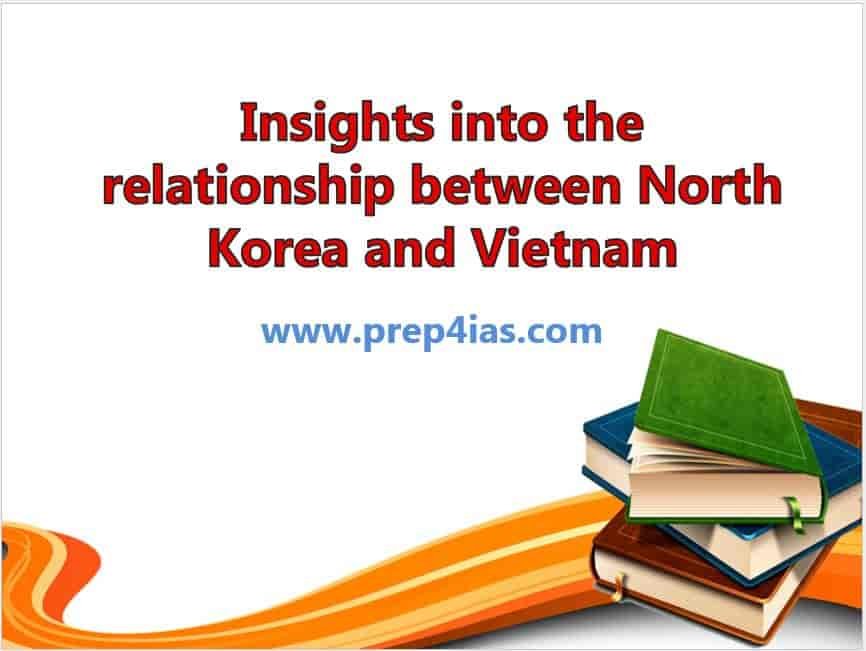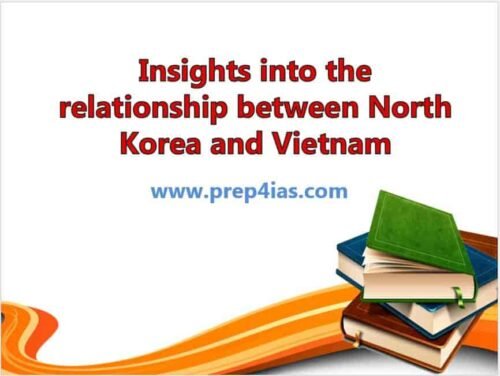The relationship between Vietnam and North Korea (officially the Democratic People’s Republic of Korea, DPRK) has a complex history, characterized by periods of both solidarity and distance. The relationship is rooted in their shared communist ideology and the historical support they provided to each other during times of conflict. The historical ties and occasional diplomatic gestures between Vietnam and North Korea reflect a relationship that, while constrained by international dynamics, retains a degree of historical goodwill and ideological affinity.

Historical Context
Also Read: Kuril Islands - Disputed Territory between Japan and Russia
The historical context between Vietnam and North Korea is rooted in their shared experiences as communist states during the Cold War, their struggles against perceived imperialist forces, and mutual support during Vietnam's conflict periods. Here's a deeper look into the historical ties between the two nations:-
Shared Ideological Foundations
Both Vietnam and North Korea were founded as socialist states, with North Korea established in 1948 and the Democratic Republic of Vietnam declared in 1945. Their communist ideologies and opposition to Western powers aligned them with each other and with other socialist states during the Cold War.
Support During the Vietnam War
One of the most significant aspects of the Vietnam-North Korea relationship is the support provided by North Korea to North Vietnam during the Vietnam War (1955-1975). North Korea's assistance included:-
- Military Aid: North Korea sent military equipment, ammunition, and supplies to assist the North Vietnamese and the Viet Cong.
- Personnel: It is reported that North Korea sent pilots and other military personnel to directly participate in combat operations against South Vietnamese and American forces.
- Political Solidarity: Beyond material support, North Korea offered strong political backing to North Vietnam in the international arena, presenting a united front against the US and its allies.
Personal Relationships Between Leaders
The personal relationship between North Korean leader Kim Il-sung and Vietnamese President Ho Chi Minh played a crucial role in fostering close ties between the two countries. Their mutual respect and ideological alignment helped solidify the partnership.
Post-war Relations
After the end of the Vietnam War and the reunification of Vietnam, the relationship between Vietnam and North Korea continued, but it evolved over time. While they maintained diplomatic relations and continued to share a nominally socialist brotherhood, the nature of their interaction changed, particularly as Vietnam embarked on economic reforms and opened up to the world in the late 20th century.
Diverging Paths
By the end of the 20th century and into the 21st, Vietnam and North Korea found themselves on increasingly divergent paths. Vietnam's "Đổi Mới" economic reforms, initiated in 1986, led to rapid economic growth and integration into the global economy. In contrast, North Korea remained isolated, with its economy heavily impacted by international sanctions due to its nuclear weapons program.
Despite these differences, the historical context of their relationship - a shared struggle against imperialism, mutual support during critical periods of conflict, and ideological affinity - continues to underpin the relationship between Vietnam and North Korea, even as the practical aspects of their interaction have evolved.
Recent Developments
Recent developments in the relationship between North Korea and Vietnam have been shaped by the evolving geopolitical landscape, Vietnam's economic growth and integration into the global community, and the ongoing international concerns regarding North Korea's nuclear program. Here are some key points highlighting the recent developments in their relations:-
- Diplomatic Engagements: High-level visits between North Korea and Vietnam have occurred, though they are relatively rare. These visits often serve to reiterate historical ties and discuss potential areas of cooperation within the constraints of international sanctions on North Korea.
- 2019 Hanoi Summit: A significant recent event was the choice of Hanoi, Vietnam, as the venue for the second summit between North Korean leader Kim Jong-un and U.S. President Donald Trump in February 2019. While the summit primarily focused on U.S.-North Korea relations, Vietnam's role as host highlighted its diplomatic standing and its potential as a mediator. It also showcased Vietnam's economic reforms and development as a possible model for North Korea.
- Economic Reforms and Potential Learning: There has been speculation that North Korea may look to Vietnam's economic reforms, known as "Đổi Mới", as a potential model for its own economic development. Vietnam transitioned from a centrally planned economy to a more market-oriented one, leading to significant economic growth and poverty reduction. The interest, if any, from North Korea in learning from Vietnam's experience would be within the context of maintaining its own political and social system.
- Adherence to Sanctions: Vietnam, as a member of the United Nations and an increasingly integrated member of the global economy, adheres to UN sanctions against North Korea. This adherence affects the scope of their bilateral relations, particularly in terms of economic and military cooperation.
- Cultural and Educational Exchanges: Despite the limitations imposed by international sanctions, there have been some cultural and educational exchanges between the two countries. These exchanges are often low-key and aim to maintain a basic level of diplomatic relations.
- North Korea's Isolation: The increasing isolation of North Korea due to its nuclear weapons program and the resulting international sanctions have limited the extent to which Vietnam can engage with North Korea, especially in comparison to Vietnam's burgeoning relations with other countries, including South Korea.
Challenges and Limitations
The relationship between North Korea and Vietnam faces several challenges and limitations, influenced by regional dynamics, international sanctions, and their differing paths in economic development and global integration. Here are some key challenges and limitations:-
- International Sanctions on North Korea: Vietnam, as a responsible member of the international community, adheres to United Nations sanctions imposed on North Korea due to its nuclear weapons program. These sanctions limit the scope of economic, military, and technological cooperation between the two countries.
- Vietnam's Global Integration: Vietnam's extensive economic reforms ("Đổi Mới") and its integration into the global economy contrast sharply with North Korea's isolation. Vietnam's growing ties with Western countries, including the United States, and its participation in international organizations and trade agreements, might strain its relations with North Korea.
- Economic Disparities: The economic gap between the two countries has widened significantly. Vietnam's successful transition to a market-oriented economy and its resulting economic boom stand in stark contrast to North Korea's economic struggles and reliance on a centralized, planned economy. This disparity makes economic collaboration more challenging.
- Diplomatic Balancing: Vietnam maintains a diplomatic relationship with South Korea, which is one of its key economic partners. The relationship between North and South Korea remains tense, and Vietnam has to carefully balance its relations with both Koreas.
- Human Rights Concerns: North Korea's human rights record poses a challenge for Vietnam, which seeks to maintain positive relations with Western nations. Supporting or appearing too close to North Korea could lead to international criticism and potentially impact Vietnam's international relationships.
- Limited Areas for Cooperation: Given the sanctions and North Korea's international isolation, there are limited areas where the two countries can cooperate. While there might be some scope for cultural and educational exchanges, significant economic or technological collaboration is restricted.
- Regional Security Concerns: North Korea's nuclear ambitions and missile tests contribute to regional instability, which is a concern for Vietnam and other Southeast Asian countries. Vietnam's interest in regional stability may limit its engagement with North Korea.
- Impact of Global Pandemic: The COVID-19 pandemic has further isolated North Korea, as it closed its borders to prevent the spread of the virus. This has impacted any potential diplomatic or economic exchanges between North Korea and other countries, including Vietnam.

